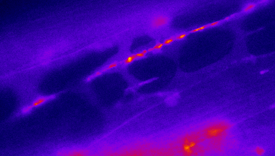
Angelica Ronald, Ph.D.
Professor of Psychology and Genetics, Centre for Brain and Cognitive Development, Birkbeck, University of London
SFARI Investigator WebsiteAngelica Ronald is professor of psychology and genetics at the Centre for Brain and Cognitive Development, Birkbeck, University of London, where she co-directs the Genes Environment Lifespan laboratory. She has a B.A. in experimental psychology from the University of Oxford (Class I), a Ph.D. in quantitative genetics from King’s College London and gained postdoctoral training in molecular genetics funded by an Autism Speaks fellowship.
Ronald has 19 years’ experience of large-scale research with a focus on genetic and environmental causes of neurodevelopment and mental health in children and adolescence. Her research includes the first study to show high genetic overlap between autism and attention deficit hyperactivity disorder (ADHD) in childhood, which influenced changes in the Diagnostic and Statistical Manual of Mental Disorders (DSM-5) to allow co-diagnosis. She has over a decade’s experience in conducting genome-wide association studies, including on autistic traits and, more recently, on psychotic experiences. She is a co-investigator of the Babytwins Study Sweden, a longitudinal study of infant twins that uses an extensive neurocognitive battery.
Ronald has published more than 110 publications and is an Association for Psychological Science (APS) Fellow. She has been awarded numerous national and international grants (as principaI investigator and collaborator), including a U.K. Medical Research Council New Investigator Research Grant. Her research prizes include the APS Janet Taylor Spence Award and the British Psychological Society Spearman Medal. She currently serves as an editor of the Journal of Child Psychology and Psychiatry (ranked top in the field of developmental psychology).
In autumn 2020, she co-founded the London Genetics Network, a new hub funded by the Genetics Society to increase collaboration, support for early career researchers and skill sharing in human genetics research in and around London. She is delighted to work with SFARI and her team of collaborators on the genetic architecture of infant motor development and its links with autism.
